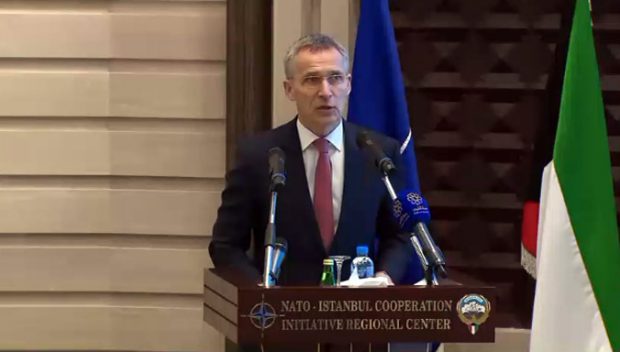NATO marks 15 years of partnership with Gulf countries

Jens Stoltenberg (KUNA)
Brussels: North Atlantic Treaty Organization (NATO) Secretary General Jens Stoltenberg has reiterated the alliance’s commitment to its partnership with the Istanbul Cooperation Initiative (ICI) launched in 2004 to contribute to long-term global and regional security with the Arab countries in the Gulf.
“The security of our ICI partners is of strategic importance to NATO. Through the Istanbul Cooperation Initiative, we have a unique platform where we discuss security issues of common concern,” Stoltenberg said.
“Over the years, we have increased the quantity and the quality of our cooperation; and our NATO-ICI Regional Centre in Kuwait has helped NATO’s outreach to the Gulf Cooperation Council, Saudi Arabia and Oman. It is the sovereign prerogative of these countries, ultimately, to decide how they want to move this process forward,” he added in an interview with Kuwait News agency (KUNA).
Kuwait joined the ICI in December 2004, Bahrain and Qatar in February 2005 and the United Arab Emirates (UAE) in June 2005.
“We can be proud of the past 15 years of partnership under the framework of the Istanbul Cooperation Initiative. We have conducted a wide range of practical activities, from military training and education, to crisis management, and dealing with natural and man-made disasters,” he said.
All the four Gulf partners in the ICI have Individual Partnership Cooperation Program with NATO, he noted.
Under these agreements, a wide range of activities has taken place, including on energy and maritime security, cyber defense, and civil emergency planning, he stated.
He said that ICI countries have taken part in many of NATO operations and missions, including in Kosovo, Afghanistan and Libya.
“Our upcoming visit will be an opportunity to take stock of the achievements made and to discuss our common way forward with our partners to make our partnership even more efficient,” indicated Stoltenberg.
The NATO-ICI Centre in Kuwait has welcomed more than 1,000 officers and experts from NATO and the Gulf there, for joint training, cooperation and capacity building, he noted.
“We are also working together to develop national expertise and resilience on crisis management, cyber security, energy security, maritime security, and defense against Chemical, Biological, Radiological and Nuclear threats,” he said.
“Our NATO-ICI Regional Centre in Kuwait offers us the possibility to step up our cooperation in a number of areas, including interoperability, which enhances our ability to work together to manage future crises through joint training,” said Stoltenberg, a former Prime Minister of Norway.
“We also continue – through our NATO Mission in Iraq – to strengthen the Iraqi military in their fight against international terrorism, to ensure that Daesh (so-called Islamic State) can never return,” he stated.
“Furthermore, we believe that as a regional organization, the Gulf Cooperation Council is playing a key role in dealing with the crises affecting the security of its members. A leading principle of our cooperation is non-discrimination of any of our partners. We all have an interest in a unified Gulf Cooperation Council, “added the NATO Secretary General.
He said NATO is following developments in the region very closely.
“With instability in the Middle East and North Africa, NATO’s partnerships are more valuable than ever.
At our leaders’ meeting in London on December 3-4, we reaffirmed that NATO is a defensive Alliance and poses no threat to any country. We work to increase security for all,” he said.
“As a multilateral organization, we have strengthened partnerships in our neighborhood and beyond, and we have deepened political dialogue, support, and engagement with partner countries and international organizations. Over the years, we have increased our consultations on security issues of common concern; and on the practical side, our partners have engaged in more focused cooperation activities,” he said. In the interview ahead of his visit to Kuwait to celebrate the 15th anniversary of the ICI.
At its Chicago summit in May 2012, NATO in its final communiqué said that it looked forward to a better understanding of common security threats in the region.
“We will strengthen political dialogue and practical cooperation in the ICI,” the communiqué said. “We warmly welcome the generous offer by the State of Kuwait to host an ICI Regional Centre, which will help us to better understand common security challenges, and discuss how to address them together. We encourage our ICI partner countries to be proactive in exploiting the opportunities offered by their partnership with NATO. We remain open to receiving new members in the ICI,” the alliance said.
























































